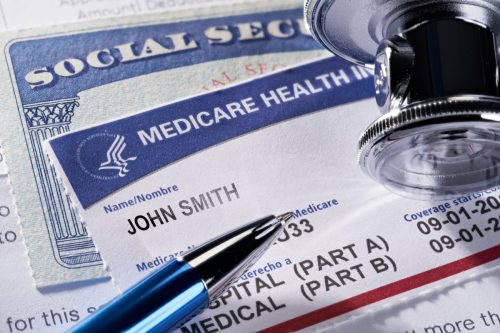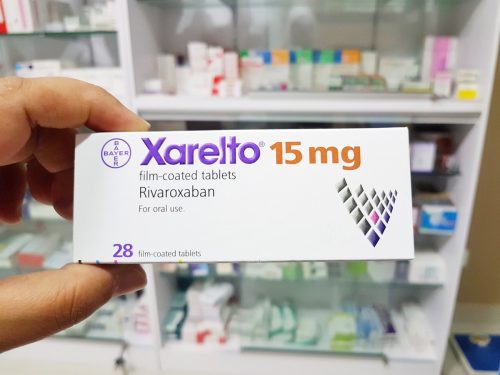10 Common Drugs You Can Soon See “Huge Savings” on Under Medicare

More than half of the U.S. population relies on prescription medications for their health. And even with good insurance coverage, these drugs can still be expensive. Depending on your coverage, trips to the pharmacy can cost anywhere from hundreds to thousands of dollars out-of-pocket every year. But relief may be on the way if you’re covered under Medicare, as new price negotiations are set to cut costs for customers under the federal health insurance program. Read on to discover the 10 common drugs you may soon see “huge savings” on under Medicare.
RELATED: 4 Popular Medications That Medicare Will Never Cover.
A new law will allow Medicare to cut prescription prices.

The Inflation Reduction Act was signed into law by President Joe Biden in Aug. 2022, and it includes several provisions meant to lower prescription drug costs for people covered under Medicare.
Under one of the provisions, the price negotiation program, Medicare will be allowed to negotiate directly with drug manufacturers to lower the price for some of the costliest prescriptions, according to U.S. Centers for Medicare & Medicaid Services (CMS) website.
“This means that people with Medicare will have increased access to innovative, life-saving treatments, and the costs will be lower for both them and Medicare,” CMS explains.
Now, officials have finally revealed the first 10 drugs that could see Medicare price cuts.
RELATED: The 4 Most Expensive Medications You Can Be Prescribed.
The first 10 drugs subject to price negotiations were just announced.

This landmark prescription program is now underway. On Aug. 28, the Biden administration unveiled the names of the first 10 medications that will be subject to the Medicare price negotiations. The selected drugs are Eliquis, Jardiance, Xarelto, Januvia, Farxiga, Entresto, Enbrel, Imbruvica, Stelara, and certain Novo Nordisk insulin products.
According to the U.S. Department of Health and Human Services (HHS), approximately 9 million Medicare enrollees took at least one of these 10 prescriptions in 2022. Many of these commonly used drugs are prescribed to prevent and treat life-threatening conditions, such as diabetes, heart failure, and cancer.
RELATED: 2 Medications Recalled After Major Mix-Up: “Serious Adverse Events,” FDA Warns.
These medications cost Medicare patients billions last year.

The 10 drugs that were selected are among those with the “highest total spending” for Medicare patients in Part D of the federal health insurance program. According to the HHS, Medicare enrollees paid a total of $3.4 billion in out-of-pocket costs for these medications in 2022.
The average enrollee has been paying anywhere from $121 to $5,427 annually for these drugs, and some enrollees without extra financial assistance were paying as much as $6,497 out-of-pocket in just one year.
“For far too long, Americans have paid more for prescription drugs than any major economy,” President Biden said in an Aug. 29 statement. “And while the pharmaceutical industry makes record profits, millions of Americans are forced to choose between paying for medications they need to live or paying for food, rent, and other basic necessities. Those days are ending.”
RELATED: For more up-to-date information, sign up for our daily newsletter.
But savings won’t kick in for another three years.

The Biden administration said that negotiations for the first group of selected drugs will begin sometime this year.
As CNN explained, CMS will offer up discounts ranging from at least 25 to 60 percent off the nonfederal average manufacturer price of these medications, based on different factors including their clinical benefits and the price of alternatives. Following negotiations with drugmakers, the agency will then publish the agreed-upon fair prices by Sept. 1, 2024, according to the news outlet.
“It’s pretty obvious that there are huge savings to be had here, for even a small number of drugs,” Benjamin Rome, MD, a health policy researcher at Brigham and Women’s Hospital and Harvard Medical School, told CNN.
The new negotiated prices won’t actually go into effect until 2026, but the potential impact may be worth the wait—especially for individuals who are not taking their necessary medications because of the high costs.
“The number one reason seniors skip or ration their prescriptions is because they can’t afford them. This must stop,” Nancy LeaMond, chief advocacy and engagement officer for AARP, told CNN. “Allowing Medicare to negotiate prices for these first 10 drugs will finally bring much needed access and relief to American families, particularly older adults. We cannot overstate how monumental this law is for older Americans’ financial stability and overall health.”
- Source: https://www.congress.gov/bill/117th-congress/house-bill/5376
- Source: https://www.cms.gov/inflation-reduction-act-and-medicare
- Source: https://www.whitehouse.gov/briefing-room/statements-releases/2023/08/29/fact-sheet-biden-harris-administration-announces-first-ten-drugs-selected-for-medicare-price-negotiation/
- Source: https://aspe.hhs.gov/sites/default/files/documents/705b9c384d493e442a1d4004905cf8ae/ASPE-IRA-Drug-Negotiation-Fact-Sheet.pdf
- Source: https://www.whitehouse.gov/briefing-room/statements-releases/2023/08/29/statement-from-president-joe-biden-on-historic-action-to-lower-prescription-drug-costs/